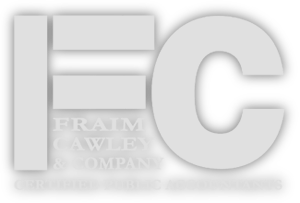Originally published November 11, 2013
“Necessity is not an established fact, but an interpretation” – Friedrich Nietzsche
I love my job. As dry as accounting seems, I find it fascinating. You get insight into a business’s operations and finances – truly the core of what is going on. People open up to you on things they would not with someone who is not a financial professional. You get a view into their lives that few other people are allowed.
And this insight goes beyond simply the core of finances. As you discuss with people the best way to approach their issue, you start to find out about their lives in general. And in these discussions various psychological perspectives on money become apparent. As I’ve briefly opined before, sometimes business owners are less inclined to tighten their belts than called for when times get tough. On the other hand, some people go to the other extreme of cost reduction – possibly to their detriment. It seems that few people fully understand what necessity truly is.
To illustrate these two mindsets I have invented two of the lamest superheroes in history: Captain Penny Pincher and Excessive Spending Man.
Captain Penny Pincher
All right, this guy is fairly obvious. Things are bad or start to go downhill financially and he cuts spending. He cuts anywhere and everywhere he can to get rid of so-called “fat”. Most accountants love this guy. I hate him. Why?
One of my bigger issues with other accountants in general is that they just look at the bottom line and try to “reduce costs, reduce costs, reduce costs”. That’s great – to a point. But what Captain Penny Pincher and these accountants fail to consider is this: “saving” money can easily cost you money.
What do I mean? In the majority of cases you are getting something for the money you spend. The key is to figure out if you are getting an adequate return on each expenditure. When a business goes downhill, some people start to indiscriminately slash and burn their budgets. They close down offices, cut staff, reduce advertising, stop traveling to visit clients, and start doing every task themselves. Then they are very proud because they saved $60,000.
The sounds good on the surface, but what was given up? For example, let’s say they closed one location and laid off the office person there, but then they lost $80,000 worth of business because the customers left. That $60,000 in reduced expenses ended up reducing their income by $20,000. And all of their time is spent on menial tasks instead of managing the business, which further hurts them. All in the name of “saving” money.
Excessive Spending Man
ESM (as he is commonly known since he is a household brand as of this email) operates in the opposite fashion. And while both habits can be equally detrimental, Excessive Spending Man’s refusal to recognize/try to correct the situation makes it even less forgivable. He can’t seem to stand reducing personal spending, no matter how lavish it may be. He “needs” his Starbucks every morning. He “needs” to go eat fancy dinners every night. He “needs” to take trips to Cabo every month. And the business operates just as it has – even if it is losing money or has consistently negative cash flow.
The positive thing about ESM is that he is not afraid to spend money where he needs to. The unfortunate part is that he refuses to eliminate spending in the areas he does not. In personal life there are numerous ways to live more simply. And in the business there are areas that need to be cut. Sometimes staff members do need to be let go – either based on their performance or the number of people doing a job. Some overhead costs are excessively high. Some forms of advertising simply are not cost effective. ESM bemoans the state of his company but refuses to get the help he needs to correct the issues.
“In All Things Balance”
My Dad (Rob Fraim of Mid-Atlantic Securities) said that phrase to me so many times growing up that I assumed it was a quote, scripture, or African proverb. It wasn’t – it was just something he said. But no other piece of advice has ever held so true in every situation I have encountered. And it holds true here.
You cannot go around cutting every expense possible. It ends up being a “penny wise and pound foolish” approach. My friend Lively at the Roanoke Times (one more shout-out to come) uses a quote I have always loved: “[a] man who stops advertising to save money is like a man who stops a clock to save time” – Henry Ford. Revenues in a business are not where they need to be and most people immediately do not want to spend money on advertising. What sense does that make? Spend smartly and effectively, but spend! This is a concept that is beyond the comprehension of most “bean counter” CPAs.
Liz offers a Daily Deal that can be great publicity for businesses. And as far as business marketing and exposure I also always recommend effective internet search engine optimization (SEO) work. While it should not be the only form of advertising a company uses, it has the highest ROI and should certainly be the first.
If you truly do not have enough work, then you have no reason to hire help. Most people do not go out cold calling with the extra five hours a day they have but often just sit around twiddling their thumbs. But once things get busier, business owners need to consider what areas of responsibility to relinquish. Do you as an owner really need to be doing basic administrative duties when you could be performing services, maintaining customer relationships, or drumming up new clients? At a certain point it makes sense to get rid of some of these duties so you can focus on managing your actual business.
One of the things I almost always recommend to business owners is to hire out payroll to Jen Stevenson. Given the monthly cost of payroll programs, the high chance of error, and the huge fees that are charged for mistakes – it is highly advisable for most companies to farm this service out to a specialist.
The examples of areas to continue (or start) spending money are countless. But at the same time business owners need to be cognizant of the reality of their business and their own personal habits. In down periods, things do need to be cut. The crucial point is to find out which areas are providing the least value and eliminating them. And personal spending must go down or else the business will be bled dry. But if all of this is not done strategically, these changes can do more harm than good.
And therein lies the rub. Guessing at what to cut and what to spend is an approach fraught with peril. Analyzing is one thing – the smart thing. Taking a wild stab at it is quite another. This is one area in which I assist businesses and one of the things I enjoy doing most. Helping business owners assess expenditures and develop an optimal approach to business spending is a fascinating experience for me – and one from which I derive particular pleasure, because it so frequently translates directly into improved profits and success for my business owner clients. Please visit me online at FraimCPA.comor call me at (540) 314-0345 if you have any questions or would like to schedule your free consultation.
So at the risk of making this a commercial plug for myself…oh what the heck, I “shouted out” for everyone else – I might as well plug my own business – fire the lame superheroes mentioned above, those business numbskulls, and hire this superhero: Captain Accountant.
IRS Circular 230 Notice: To ensure compliance with requirements imposed by the IRS, we inform you that any federal tax advice contained in this communication (including any attachments) is not intended or written to be used, and cannot be used, for the purpose of avoiding penalties under the Internal Revenue Code.




